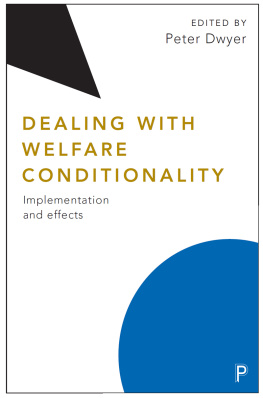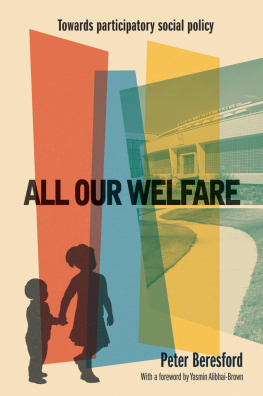DEALING WITH WELFARE CONDITIONALITY
Implementation and effects
Edited by Peter Dwyer
First published in Great Britain in 2019 by
Policy Press University of Bristol 1-9 Old Park Hill Bristol BS2 8BB UK Tel +44 (0)117 954 5940 e-mail
North American office: Policy Press c/o The University of Chicago Press 1427 East 60th Street Chicago, IL 60637, USA t: +1 773 702 7700 f: +1 773-702-9756
Policy Press 2019
British Library Cataloguing in Publication Data
A catalogue record for this book is available from the British Library
Library of Congress Cataloging-in-Publication Data
A catalog record for this book has been requested
ISBN 978-1-4473-4182-6 hardcover
ISBN 978-1-4473-4184-0 ePub
ISBN 978-1-4473-4185-7 Mobi
ISBN 978-1-4473-4183-3 ePdf
The right of Peter Dwyer to be identified as editor of this work has been asserted by him in accordance with the Copyright, Designs and Patents Act 1988.
All rights reserved: no part of this publication may be reproduced, stored in a retrieval system, or transmitted in any form or by any means, electronic, mechanical, photocopying, recording, or otherwise without the prior permission of Policy Press.
The statements and opinions contained within this publication are solely those of the editor and contributors and not of the University of Bristol or Policy Press. The University of Bristol and Policy Press disclaim responsibility for any injury to persons or property resulting from any material published in this publication.
Policy Press works to counter discrimination on grounds of gender, race, disability, age and sexuality.
Cover design by Andrew Corbett
Front cover image: Andrew Corbett
This book has been optimised for PDA.
Tables may have been presented to accommodate this devices limitations.
Image presentation is limited by this devices limitations.
Contents
| Peter Dwyer |
| Helen Stinson |
| Larissa Povey |
| Regina Serpa |
| Katy Jones |
| Liviu Dinu and Lisa Scullion |
| Emily Ball |
| Peter Dwyer |
List of abbreviations
| APA | Alternative Payment Arrangement |
| ASB | Anti-Social Behaviour |
| CEE | Central and Eastern Europe |
| CJS | Criminal Justice System |
| DCLG | Department for Communities and Local Government |
| DWP | Department for Work and Pensions |
| ESA | Employment and Support Allowance |
| ESRC | Economic and Social Research Council |
| EU | European Union |
| GPoW | Genuine Prospect of Work |
| JSA | Jobseekers Allowance |
| NGO | Non-Governmental Organisation |
| SCSH | Scottish Council for Single Homelessness |
| TFP | Troubled Families Programme |
| UC | Universal Credit |
| WelCond | Welfare Conditionality: Sanctions, Support and Behaviour Change project |
| WP | Work Programme |
| WRAG | Work-Related Activity Group within ESA |
Notes on contributors
Emily Ball is a Teaching Associate at the University of Birmingham. Her chapter in this book draws on work undertaken for an ESRC White Rose Doctoral Training Centre funded studentship investigating the use of conditionality mechanisms in family-based interventions. This was undertaken in the Department of Urban Studies and Planning, University of Sheffield, and her doctorate was awarded in March 2018. Her research interests include welfare conditionality, parenting, inequality, and governance and social control. Recent publications have explored the design and use of family-based interventions in policy since 1997, alongside a critical application of Loic Wacquants work.
Ion Liviu Iulian Dinu is in the third year of a Social Policy PhD based in the Sustainable Housing and Urban Studies Unit, School of Health and Society at the University of Salford. His doctoral work on Romas experience of welfare conditionality in the UK is funded by a University of Salford Pathway to Excellence Research Studentship. He has previously published articles on Life in the neo-liberal ghetto and How to use children to get power (both in 2014).
Peter Dwyer is Professor of Social Policy in the Department of Social Policy and Social Work, University of York, UK. His research and teaching interests focus on topics related to social citizenship, welfare conditionality and international migration and its implications for migrants rights and welfare states. He has published widely on these issues. His work has been supported by a range of funders, including the ESRC, the European Commission and the Joseph Rowntree Foundation. Between 2013 and 2019, he led the Welfare Conditionality: Sanctions, Support and Behaviour Change project (WelCond): www.welfareconditionality.ac.uk
Katy Jones is a Senior Research Associate in the Centre for Decent Work and Productivity at Manchester Metropolitan University. She worked on the Welfare Conditionality: Sanctions, Support and Behaviour Change project between 2014 and 2018. Her chapter in this book draws on work simultaneously undertaken for her doctoral thesis at the Department of Educational Research, Lancaster University. She was awarded her doctorate in April 2018. Her research interests focus on labour market disadvantage and employment-related support. She has published widely on topics including youth unemployment, vocational training, social security and skills policy, wage inequality, and poverty.
Larissa Povey is a final-year doctoral student in the Centre for Regional Economic and Social Research (CRESR) and a Lecturer in Criminology at Sheffield Hallam University. Her PhD research on womens experiences of penal and welfare policy interventions was funded by a Sheffield Hallam University Vice-Chancellors PhD Scholarship. Her work explores the gendered dimensions of advanced marginality. Recent publications focus on the experiences of marginalised women in Austerity Britain (Social Policy and Society, 2017) and the impact of Universal Credit in Rotherham (CRESR, 2018).
Lisa Scullion is Professor in Social Policy and Associate Director at the Sustainable Housing and Urban Studies Unit, University of Salford. Her research focuses on the experiences of marginalised groups within the welfare system. Her past work has been supported by the European Commission, the Home Office, the Joseph Rowntree Foundation, and various local authorities and third sector organisations. She is currently leading a two-year study focusing on the experiences of military veterans in the social security system funded by the Forces in Mind Trust.
Regina Serpa is Associate Tutor at the University College of Estate Management, and Visiting Lecturer at the University of Westminster. Her doctoral study, entitled Choice, Constraint and Negotiating Housing Systems: Analysing migrant homelessness in the US and UK context, was funded by a James Watt Studentship in the Institute for Social Policy, Housing, Equalities Research at Heriot-Watt University, Edinburgh. She is a Corporate Member of the Chartered Institute of Housing and an Associate Member of the Royal Town Planning Institute. Recent publications consider social housing in Scotland and the right to settled accommodation in Scotland.









